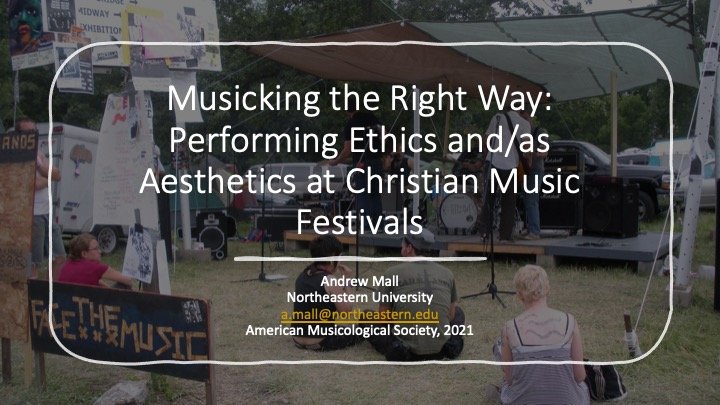Musicking the Right Way: Performing Ethics and/as Aesthetics at Christian Music Festivals
At Cornerstone Festival in Illinois (1984–2012), organizers booked Christian musicians who performed styles peripheral to the pop music prized by the largest Christian record labels that dominated the Nashville-centered “contemporary Christian music” industry. As Cornerstone’s former organizer, John Herrin, explained to me, “Maybe they were a little too evangelical in who they were and what they stood for to make it in the general market [secular music industry], but a little too wild to really play a part of the fairly conservative Christian music scene at the time.” Christian artists who played EDM, emo, goth, hardcore, heavy metal, hip hop, metalcore, new wave, punk, and other peripheral styles came to rely on Cornerstone as a primary site of career-sustaining performance; attendees relied on Cornerstone as a primary site of musical discovery. Cornerstone performed its organizers’ ethics into being, witnessed in its do-it-yourself scrappiness, its (at times) overwhelming sonic chaos, its sanctioned attendee-operated “generator stages,” and its willingness to engage difficult theological questions (as Herrin told me, the festival provided an “opportunity to bring ‘thinking Christianity’ to the table”). From one perspective, this reflects a tautological relationship between orthodoxy and orthopraxy grounded in theology; another perspective reveals the co-constitutiveness of ethics and aesthetics grounded in practice. To recast Jeffers Engelhardt’s “right singing” (2015, 11), at Cornerstone, if the performing was right, then the ethics expressed in that performing were right, and if the ethics were right, then the musical practices grounded in those ethics were right. In this paper, I draw on theories of music and ethics rooted in Christian musicking (Rommen 2007, Engelhardt 2015, Myrick 2021, Myrick and Porter 2021) and return to my ethnographic fieldwork during Cornerstone’s final few years to generate a theoretical framework that situates these practices not within a shared faith but rather within a shared ethical framework irrespective of religious belief. Cornerstone’s dusty farmland outside Bushnell, Illinois—only a few hours’ drive from Chicago—was a place where a musicking community’s ethics and aesthetics were so tightly intertwined that they became indistinguishable from each other: they were musicking the right way.
